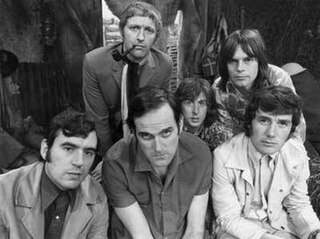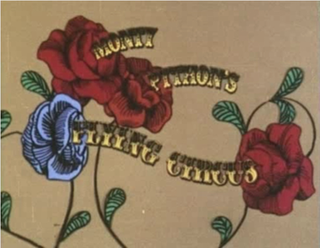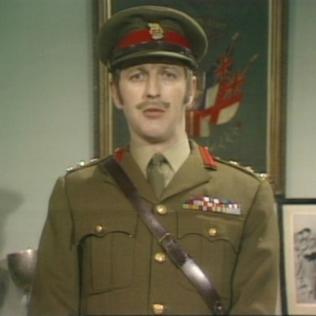Related Research Articles

Graham Chapman was an English actor, comedian and writer. He was one of the six members of the surreal comedy group Monty Python. He portrayed authority figures such as the Colonel and the lead role in two Python films, Holy Grail (1975) and Life of Brian (1979).

Monty Python were a British surreal comedy troupe who created the sketch comedy television show Monty Python's Flying Circus, which first aired on the BBC in 1969. Forty-five episodes were made over four series. The Python phenomenon developed from the television series into something larger in scope and influence, including touring stage shows, films, albums, books and musicals. The Pythons' influence on comedy has been compared to the Beatles' influence on music. Regarded as an enduring icon of 1970s pop culture, their sketch show has been referred to as being "an important moment in the evolution of television comedy".

The Cheese Shop is a well-known sketch from Monty Python's Flying Circus.

At Last the 1948 Show is a satirical television show made by David Frost's company, Paradine Productions, in association with Rediffusion London. Transmitted on Britain's ITV network in 1967, it brought Cambridge Footlights humour to a broader audience.

Monty Python Live at the Hollywood Bowl is a 1982 concert comedy film directed by Terry Hughes and starring the Monty Python comedy troupe as they perform many of their sketches at the Hollywood Bowl. The film also features Carol Cleveland in numerous supporting roles and Neil Innes performing songs. Also present for the shows and participating as an 'extra' was Python superfan Kim "Howard" Johnson.

The Bruces sketch is a comedy sketch that originally appeared in a 1970 episode of the television show Monty Python's Flying Circus, episode 22, "How to Recognise Different Parts of the Body", and was subsequently performed on audio recordings and live on many occasions by the Monty Python team.

How to Irritate People is a US television broadcast filmed in the UK at LWT on 14 November 1968 and written by John Cleese, Graham Chapman, Marty Feldman and Tim Brooke-Taylor. Cleese, Chapman, and Brooke-Taylor also feature in it, along with future Monty Python collaborators Michael Palin and Connie Booth.

Monty Python's Fliegender Zirkus are a pair of 45-minute Monty Python German television comedy specials produced by WDR for West German television. The two episodes were respectively first broadcast in January and December 1972 and were shot entirely on film and mostly on location in Bavaria, with the first episode recorded in German and the second recorded in English and then dubbed into German.
"Election Night Special" is a Monty Python sketch parodying the coverage of United Kingdom general elections, specifically the 1970 general election, on the BBC by including hectic actions by the media and a range of ridiculous candidates.
The Undertakers sketch is a comedy sketch from the 26th episode of Monty Python's Flying Circus, entitled "Royal Episode 13". It was the final sketch of the thirteenth and final episode of the second season, and was perhaps the most notorious of the Python team's television sketches.

Monty Python's Personal Best is a miniseries of six one-hour specials, each showcasing the contributions of a particular Monty Python member. Produced by Python (Monty) Pictures Ltd., the series first aired on PBS stations between 22 February and 8 March 2006, although the Eric Idle and Michael Palin episodes were initially released by A&E on two Region 1 DVDs in 2005; the remaining episodes were released in late February 2006.
Edward Ian MacNaughton was a Scottish actor-turned-television producer and director, best known for his work with the Monty Python team. MacNaughton was director and producer for all but four of the forty five episodes of Monty Python's Flying Circus from 1969 to 1974, director of the group's first feature film And Now for Something Completely Different in 1971 and director of their two German episodes, Monty Python's Fliegender Zirkus in 1971 and 1972. In 1973 the production team shared the BAFTA Award for Best Light Entertainment Programme for Monty Python's Flying Circus.

Parrot Sketch Not Included – 20 Years of Monty Python is a British television special to Monty Python, put together to celebrate the 20th anniversary of the debut of the comedy group's television series, Monty Python's Flying Circus. Produced by Tiger Aspect Productions for the BBC, it was compiled by noted British comedy producer John Lloyd and broadcast on BBC 1 on 18 November 1989.
The Fish Licence is a sketch from Series 2 Episode 10 of the popular British television series, Monty Python's Flying Circus. It first aired on 1 December 1970.

Monty Python's Flying Circus is a British surreal sketch comedy series created by and starring Graham Chapman, John Cleese, Eric Idle, Terry Jones, Michael Palin and Terry Gilliam, who became known as "Monty Python", or the "Pythons". The first episode was recorded at the BBC on 7 September 1969 and premiered on 5 October on BBC1, with 45 episodes airing over four series from 1969 to 1974, plus two episodes for German TV.

Monty Python: Almost the Truth is a 2009 television documentary series in six parts that covers 40 years of the surreal comedy group Monty Python, from Flying Circus to present day projects such as the musical Spamalot. The series highlights their childhood, schooling and university life, and pre-Python work. The series featured new interviews with surviving members John Cleese, Terry Gilliam, Eric Idle, Terry Jones and Michael Palin, alongside archive interview footage of Graham Chapman and interviews with several associates of the Pythons, including Carol Cleveland, Neil Innes and Chapman's partner David Sherlock, along with commentary from modern comedians.

The Colonel is a recurring fictional character from the British television show Monty Python's Flying Circus, played by Graham Chapman.
"The Mouse Problem" is a Monty Python sketch, first aired on 12 October 1969 as part of Sex and Violence, the second episode of the first series of Monty Python's Flying Circus.
References
- ↑ "Monty Python's Flying Circus Transcript - Episode 38". ibras.dk. 2007. Retrieved 17 May 2013.